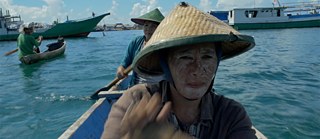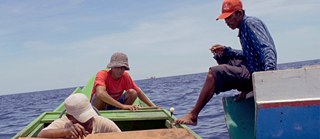Conversation
In Conversation with Yanick Kaftan

Yannick Kaftan currently studies film under Pepe Danquart at the University of Fine Arts of Hamburg, Germany. Together with four fellow students, he came to Indonesia last year for the film project 5 Islands/5 Villages and to shoot a film in Wakatobi, a small island group east of Sulawesi. Now, in the second phase of the project, he will accompany an Indonesian filmmaker on his journey to a German village.
What drove you to participate in this film project? Did you know Indonesia before?
To be honest, I hardly knew anything about Indonesia, I only had a faint idea about this country, and the project came to me unexpectedly. It was my professor who asked me if I would be interested to participate, and I was.
What kind of preparations did you do for your film?
When I knew which island I’d visit, I did a Google search to see what is available online about Wakatobi. I found images of impeccable beaches and underwater pictures of colourful coral reefs and exotic fish, as well as websites of luxurious diving resorts.
I soon found out that there are Bajau living on two of the islands. I also found some videos on YouTube about the Bajau and I tried to get more information about them – as much as it was possible from Germany.
Regarding the remote shooting location in Indonesia, the living conditions and particular situations, as well as the daily customs of the locals that are very different to Europe – what kind of challenges did you face during filming?
The biggest challenges emerged beacuse of the climate: the heat, the high humidity, which sometimes made it hard to work. The filming itself and the organisation both ran surprisingly smooth. My companion Irianto Ibrahim was a huge help for me. He practically opened all doors for me because he had a good network in Wakatobi and knows almost the whole population of the island personally.
He knew that I wanted to film something about the Bajau, so on the first evening, we immediately went to the Bajau village Mola together with his friend Adianto La Kebo, who also supported the project und helped us a lot. In Mola, I was introduced to a family. I told them that I wanted to spend some time with them and asked if they were OK with me sticking around and filming them. It wasn’t a problem. We basically resolved everything on this first evening, and the next day we went to sea on the boat and began filming.
How does filming on such a small and remote island look like? Can you tell us more? How did a typical day look like for you?
For breakfast, we had fish. Afterwards, I would go filming, either with Irianto and Adianto, or by myself on a scooter. I spent a lot of time in Mola together with the family, at other times, I explored the island on the scooter.
In the evenings, we usually met at a small fish restaurant by the sea and assessed and translated the material of the day. That was actually the most difficult part of the filming process – to translate from the language of the Bajau into Indonesian and then into English. Often, strangers came to join us in the evenings, which was very nice – everybody helped with the translations. That way, I met a lot of new people. Bernd Schoch also visited for a couple of days. He is one of the artistic mentors of the project and gave me some input for the rest of the filming process.

The main themes of the project 5 Islands/5 Villages are time and isolation. The fishermen and the women as fish suppliers are the protagonists of your film. From your perspective, how do they relate to the main theme?
The fishermen have a rather monotonous, physically demanding job. Their daily routine doesn’t change much, and the way they fish is quite laborious and requires a lot of patience because they can only catch one fish at a time. They are also very secluded on their small boat out there on the ocean.
During post-production, I glossed over all the elements of the shore and land to emphasize the feeling of isolation on the sea. The women are in a similar situation as their work is also monotonous and their way to the fish market is always the same. The talking and the rowing are dictating a clear rhythm. In my perception, work and life were strongly interwoven. Everything seems to be like a big cycle, where every family members plays their part; except for maybe the children, but even they help whenever they can. This strong merging of work and daily life and the urgency of work are some of the things that left a lasting impression.
Are there certain messages in your film Boats that you would like to convey to your audience in Europe/ Germany?
I tried to turn daily life into something fictitious, into a story. That, to me, is the strength of a documentary. If you are lucky, you will capture a situation that conveys a deeper meaning. The fishermen are dependent on their boats. If the engine doesn’t start anymore or can’t be repaired, they are stuck there. This situation contains something dramatic. And me being in the boat was quite bizarre as well. I mean, it was really a weird situation: there is this dude from Germany sitting in the boat, filming the fishermen and expecting God-knows-what. And in the end, something completely different happens. I like to play the part of the stranger, the inexperienced, as it brings an interesting dynamic into this daily routine. And finally, it’s nice how naturally I became a part of this scene. Actually, it was rather humorous, and humour connects people – this might be the message.
The film originated from your own perspective and observations. Despite that, the film will also find an audience in Indonesia. What kind of method did you use for your film to make it better and easily understandable universally?
My basis is usually the image. I like it when an image opens space for a certain place or fate of a person. As a viewer, I can enter this space and feel closer to the place or the person. I think you can become enthralled by this, this feeling to be in this place, to be able to dive into another world and feel something of the atmosphere of that place.
Ideally, the talking is only an accessory and something that simply happens, like the sound of the waves or the engine of the boat. This also makes the film more universal, if you will. You see some people on a boat, other people arrive on other boats, they talk, they fix the engine, and then they are on their way again. With the women, I particularly like the rhythm of the rowing and the way they speak to each other – that it’s repetitive – and the intonation of their voices.
Where do you plan to take your film in the future? For instance, will you submit it to film festivals in Europe and Germany?
All five films will be screened in April at the documentary film week in Hamburg, which I am very happy about. I also hope that there will be more screenings. I think it’s important that the films will be screened on the islands where they were first shot, to bring them back to their roots. And I am looking forward towards the second part of the project, when Indonesian filmmakers will come to Germany and shoot their own films in German villages, accompanied by us.
Indonesia – what do you think about when you think about Indonesia, both before your trip and the filming and afterwards, after the production of the film?
Before my trip I only had a very vague image of Indonesia: Bali and tourism, the colonial era and the fear of malaria mosquitoes, to roughly sum it up. When I think about Indonesia now... it’s hard to put into words. It is a combination of memories, faces, smells, clove cigarettes, the smell of gasoline, GoJeks, noisy streets, fish and rice, heat, ibuprofen, karaoke and hospitality – I always felt very welcome.
I believe that when you travel, there is a certain point when the impressions seem to overwhelm you and you stop wanting to understand or analyze them – and then you just go with the flow and indulge in it. That’s beautiful. I think, I will particularly remember the numerous encounters with various people, which was extremely enriching. But to be very honest, the country remains incomprehensible to me.